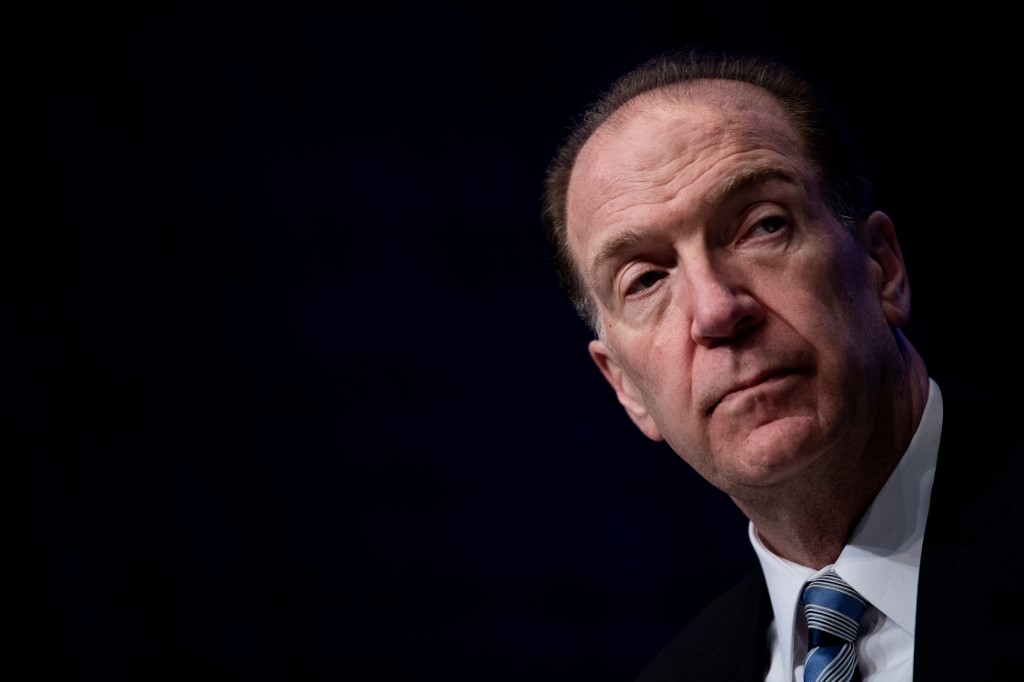G20 eyeing six-month debt relief extension: World Bank's Malpass
 |
| In this file photo taken on February 10, 2020 World Bank Group President David Malpass listens during an event at the World Bank in Washington, DC. G20 countries may only approve a six-month debt relief extension amid lagging committment to the pact meant to help poor nations weather the pandemic, World Bank President David Malpass said on on October 12, 2020.(Brendan Smialowski / AFP) |
The G20 group of largest economies is set to meet Wednesday after they pledged in April to suspend debt service from the world's poorest countries through the end of the year as they faced a sharp economic contraction caused by Covid-19.
However, Malpass said relief has been weaker than expected because "not all of the creditors are participating fully," with only $5 billion granted under the expected $8 to $11 billion, and China among the countries that holding back.
Even with the pandemic still raging, he said another full year of debt suspension is unlikely.
"I think there will be compromise language (on) maybe a six-month extension that can be renewed depending on debt sustainability," he told reporters.
The Washington-based development lender on Monday said the debt of the world's 73 poorest countries grew 9.5 percent last year to a record $744 billion, which shows "an urgent need for creditors and borrowers alike to collaborate to stave off the growing risk of sovereign-debt crises triggered by the COVID-19 pandemic."
The countries' debt burden owed to government creditors, most of whom are G20 states, reached $178 billion last year, according to the report released as the World Bank begins its annual meetings along with the IMF.
China is the largest of those creditors, seeing its share of the debt owed to all G20 countries rise to 63 percent by the end of last year from 45 percent in 2013.
Malpass decried what he called a lack of participation by private sector creditors but also said wealthier countries are not doing their full share.
"Some of the biggest official bilateral creditors, including some from China, are still not participating in the moratorium. And that creates a major drain on the poorest countries," he told reporters in a conference call.
Malpass again urged transparency on the terms of the debt, referring to China, and noting that in some cases, Beijing has rescheduled debt principal but continues to take interest payments, which could "add to the debt burden rather than relieving it."
What the stars mean:
★ Poor ★ ★ Promising ★★★ Good ★★★★ Very good ★★★★★ Exceptional
Related Contents
Latest News
More News
- Russian President congratulates Vietnamese Party leader during phone talks (January 25, 2026 | 09:58)
- Worldwide congratulations underscore confidence in Vietnam’s 14th Party Congress (January 23, 2026 | 09:02)
- Political parties, organisations, int’l friends send congratulations to 14th National Party Congress (January 22, 2026 | 09:33)
- 14th National Party Congress: Japanese media highlight Vietnam’s growth targets (January 21, 2026 | 09:46)
- 14th National Party Congress: Driving force for Vietnam to continue renewal, innovation, breakthroughs (January 21, 2026 | 09:42)
- Vietnam remains spiritual support for progressive forces: Colombian party leader (January 21, 2026 | 08:00)
- Int'l media provides large coverage of 14th National Party Congress's first working day (January 20, 2026 | 09:09)
- Vietnamese firms win top honours at ASEAN Digital Awards (January 16, 2026 | 16:45)
- ASEAN Digital Ministers' Meeting opens in Hanoi (January 15, 2026 | 15:33)
- ASEAN economies move up the global chip value chain (December 09, 2025 | 13:32)

 Tag:
Tag:




















 Mobile Version
Mobile Version